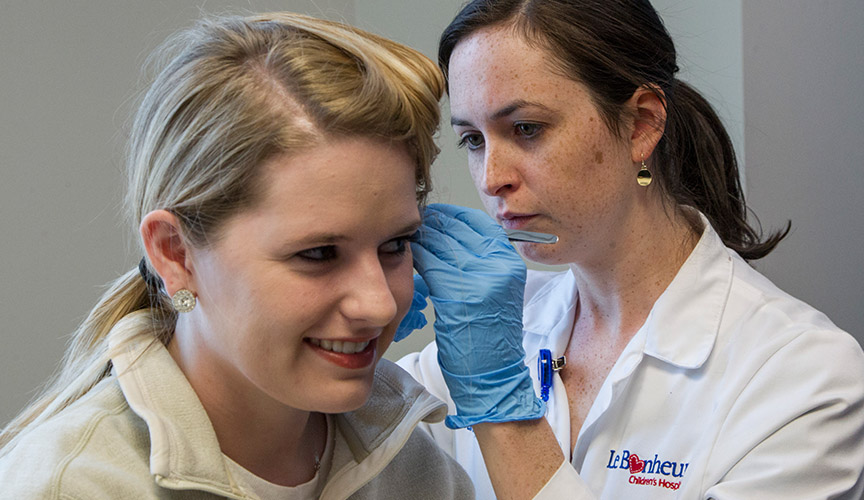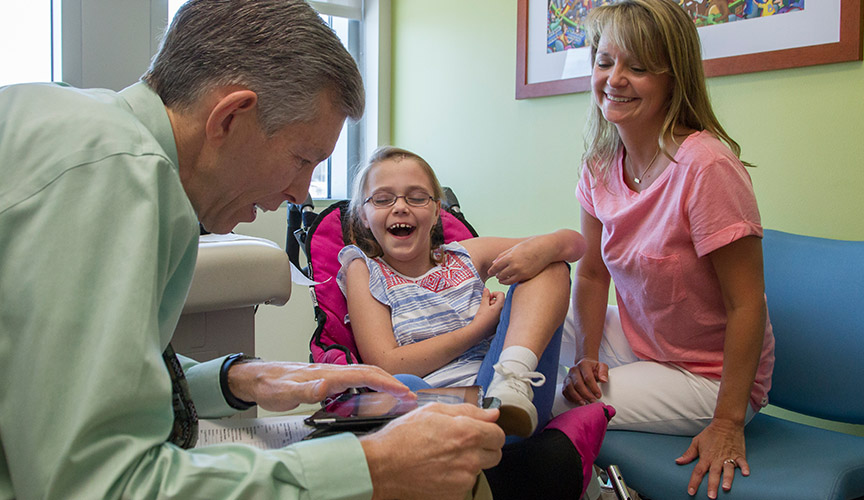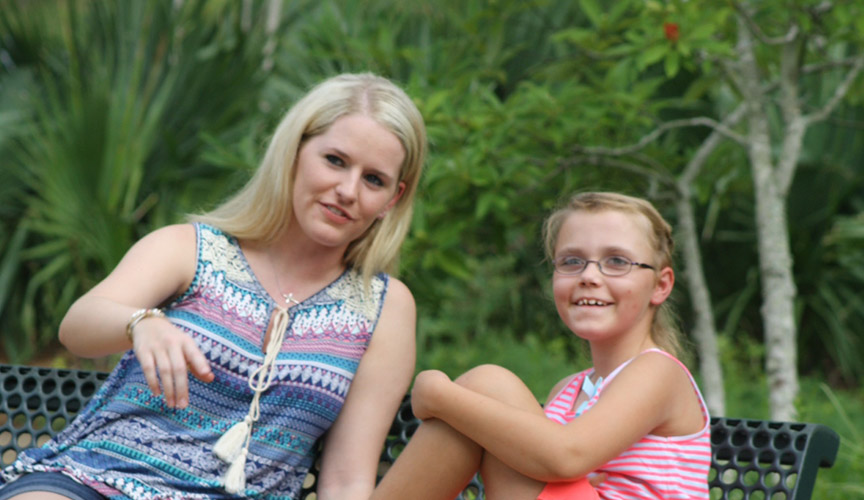Growing Friendship
For the past decade, 24-year-old Hannah Lawrence has struggled with uncontrolled seizures, making day-to-day life, like driving or going to the mall, a challenge.
Katie McCormick, 11, also knows how difficult life can be when a seizure suddenly strikes – at home, in the classroom or when she’s out with her family.
Hannah and Katie’s families, who both live in Brandon, Miss., near Jackson, have formed a special bond – a friendship that began when the families learned their daughters both suffer from epilepsy. Their bond grew stronger after Katie and Hannah both received life-changing treatment at Le Bonheur Children’s Hospital.
In the last year-and-a-half, both girls underwent brain surgery to implant a device in their brains designed to reduce seizures. Le Bonheur is one of the few hospitals in the country that offers this life-changing care for epilepsy patients.
Their stories and struggles are similar, and together they have created a life-long friendship. In the last year, the families have formed a support system and have relied on each other when Hannah and Katie’s health struggles become overwhelming.
“For so long I didn’t know any family who was going through what we are going through,” said Hannah’s mom, Rhonda Lawrence. “But it’s comforting to know that someone else out there understands what we’re going through.”
Life-changing Care

Hannah was 13 years old when she had her first seizure. Doctors in the Brandon, Miss., emergency room sent Hannah to Blair E. Baston Children’s Hospital in Jackson, Miss., where she was diagnosed with viral encephalitis, inflamation on the brain caused by a virus. She was left with scar tissue that caused uncontrolled seizures.
Hannah came to Le Bonheur in 2007 when her pediatric neurologist suggested they see James Wheless, MD, co-director of Le Bonheur’s Neuroscience Institute. At Le Bonheur, Wheless began exploring various treatment options for Hannah. Because medications did little to stop the seizures, doctors implanted a Vagus Nerve Stimulator, which helped slow her seizure activity. In 2010, Hannah had another surgery to remove a section of her brain that was responsible for the seizures.
While the surgeries helped, Hannah still couldn’t live independently. She can’t drive, she missed school and fell behind and her dream of becoming a special education teacher was put on hold.
But Wheless wouldn’t give up. He had hope that Hannah could live a life with fewer seizures. In January 2015, Hannah became the first patient in the United States to receive the NeuroPace®
RNS® system at a pediatric hospital outside of the clinical trial. The RNS device implanted in Hannah’s brain controls her seizures. Nationally, only 750 people have an RNS system, and
Le Bonheur is one of the few hospitals in the country to offer RNS therapy.
“Only because of philanthropic support are we able to offer therapy that is available nowhere else in the region, or sometimes in the United States,” Wheless said. “Generous donors allow us to provide new therapies to our patients who would otherwise not have access to. Donors impact the life of our patients in such a positive way.”
The RNS device has been life changing, Rhonda said, and her daughter is nearly seizure free.
Searching for a Cure

Katie McCormick was 5 months old when she had her first seizure, and for the last 10 years, her parents, Mark and Teresa, could only watch as their daughter suffered. At first, neurologists at their local hospital in Jackson, Miss., were able to control her seizures with medication, but after seven months, the drugs were no longer effective.
As her condition continued to worsen, Katie’s neurologist referred her to Le Bonheur where an MRI revealed a brain abnormality as the source for her seizures. That’s when the McCormicks began discussing surgical options with doctors, and Katie underwent a frontal lobe resection soon after. In four years, Katie underwent three more surgeries all with the goal of reducing her seizures.
Like Hannah, the procedures provided partial relief from her seizures, but daily activities, like sleeping in her bedroom by herself, remained difficult. In May, Katie received the NeuroPace® RNS® system and became one of the youngest children in the nation to receive the device. Katie’s seizures have slowed, Teresa said.
Forming Lifelong Friendships

In early May, Hannah, who works in her family’s barber shop, volunteered to cut Katie’s hair in preparation for surgery. During their time together, Hannah offered words of encouragement.
“I told her everything is going to be fine and that I was a little girl when I went through this,” Hannah said. “I said to her, ‘You’re going to be better.’”
That interaction put both Teresa and Katie at ease.
“It meant a lot to me for Hannah to take that time to talk to Katie,” Teresa said. “When Hannah told Katie that she had the same surgery, it made her smile.”
Since Katie’s surgery, the two families have leaned on each other for support.
“We know they’re only a phone call or text away,” Teresa said.
After more than 18 months with the RNS device, Hannah has become more independent. She can now go shopping without assistance from her parents, and she continues to work with her dad, Kenny, in the family’s barber shop. She still dreams of becoming a special education teacher.
Katie’s seizures also have slowed thanks to the treatment provided by Le Bonheur doctors, and she has become more talkative and is happier.
“Things are changing for the better in our house, and she slept in her own room for the first time,” Teresa said. “We all feel better knowing that the RNS device is on, and we’re more at ease with letting her be independent.”
Help us provide the best care for kids.
Le Bonheur Children's Hospital depends on the generosity of friends like you to help us serve 250,000 children each year, regardless of their family’s ability to pay. Every gift helps us improve the lives of children.
Donate Now













